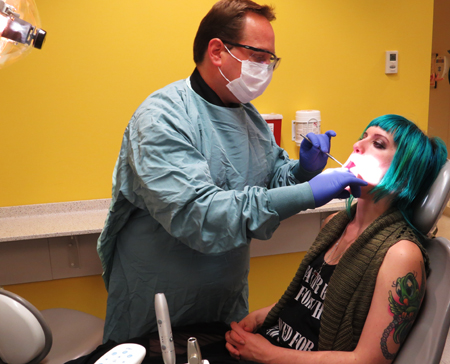
Emaleigh Whitwick has her teeth examined by head of periodontology at the School of Dentistry Liran Levin.
If you've been considering getting a tongue piercing, you may want to hold off. Having the piercing may be cool, but research shows it can cause serious oral health problems.
Lip or tongue piercings can lead to fractured teeth, gum recession, bone loss and possibly frontal tooth loss says Liran Levin, head of the periodontology division at the School of Dentistry.
"People who are getting the piercings don't know about the oral risk factors associated with it," says Levin, who's the lead researcher on Alveolar Bone Loss and Gingival Recession Due to Lip and Tongue Piercing. "Patients think its innocent fun (getting the piercing). Through our research, we've found that a vast majority are unaware of the risks."
Liran says his research found that 20.3 per cent of young adults reported having at least one type of intra or peri-oral piercing. Swelling and bleeding were reported by 51.9 per cent and 45.7 per cent, respectively. Among the research participants, 57.8 per cent were unaware of the dangers associated with intra-oral piercings. Clinical examination showed 14 per cent of the participants had fractured teeth and 26.6 per cent had gum recession.
"Constantly playing with the piercing in your mouth and the irritation that occurs from it causes gum recession, which can also lead to actual bone loss. When you're sleeping and you clench your teeth, the piercing can break and be swallowed or inhaled as well," he says. "I see patients who have cracked teeth or receded gums and end up requiring a lot of dental treatment as a result."
Seeing the dentist regularly is important. They will be able to detect any oral problems beginning to take root.
Possible severe complications from tongue or lip piercings are hemorrhaging, nerve damage, severe infection and swelling that can even lead to airway obstruction and suffocation, and infectious diseases such as HIV, hepatitis, and tetanus.
"Proper sterilization and infection control are also very important when choosing a piercer," says Levin.
Twenty-five year-old Amy Hewko is no stranger to piercings or chipped teeth. A little more than a year after getting her lip pierced, she chipped one of her front teeth while absent-mindedly playing with the bar-a bad habit that she developed shortly after the piercing healed.
"My mom told me that I could only get the piercing if I didn't chip my teeth. I honestly didn't think it would happen to me. At 16 years-old, it was humbling to admit she was right," says Hewko, jokingly. "If you insist on getting an oral piercing, do not play with it."
After having a lip piercing for two years, she began to notice her gums had started to show signs of receding, prompting her to remove the piercing permanently.
Emaleigh Whitwick, another avid piercer who's had her labret pierced for two years hasn't noticed any complications. But she hasn't seen a dentist either.
"You definitely play with the piercing a lot," she says, adding that anything you eat or drink does touch the piercing. "When you get the piercing you should follow all the instructions the piercer gives for taking care of the area."
Whitwick says if she could give advice to anyone getting a piercing it's this - chose a reputable place.
"Watch carefully to see where the piercings are being placed. I had snakebites which I had to get removed because they were digging into my lip and making it swollen. I ended up having to get them removed," she said.